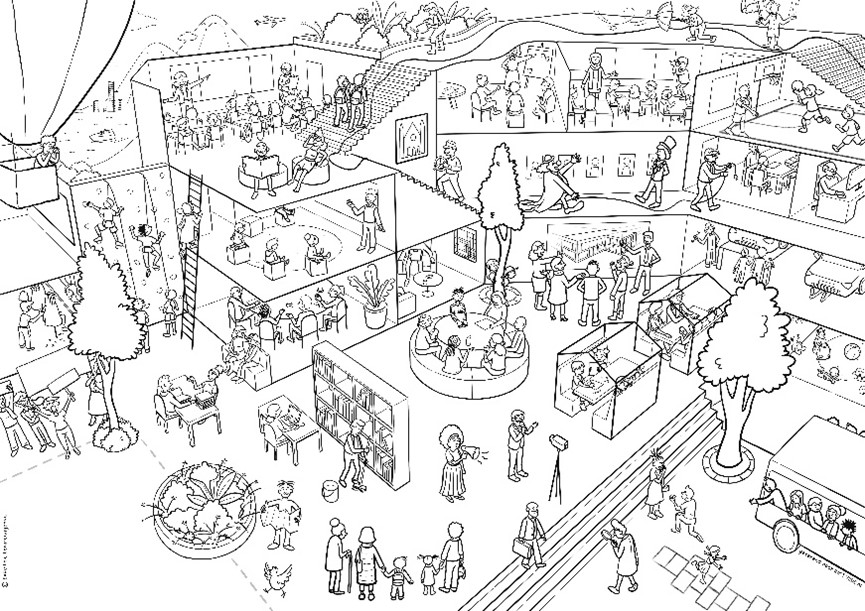How research on reflection has changed my view on reflective practice

Student teachers learning in the practice field
March 18, 2019
New ways of governance: can teacher educators take responsibility?
March 31, 2019How research on reflection has changed my view on reflective practice


Reflective practice is a common dimension of initial teacher education programmes throughout the world and the benefits of developing reflective teachers have been well documented (please see McGarr & McCormack, 2014 for more detail). While differing approaches to reflection exist, Brookfield (1995) argues that unless reflective practice is critical in nature, challenges hegemonic assumptions and power relations, it is largely ineffective. Supporting and developing critical levels of reflection is a challenge however and research I have conducted on this has changed the way I view and engage with reflective practice and reflective practice requirements as part of my role as a teacher educator. This aligns with the InFo-TED ‘research’ building block that encourages us to consider the types of research teacher education can benefit from and why research is important for teacher educators.
Working with colleagues at the University of Limerick, I have conducted three research studies examining reflective practice within initial teacher education. The findings of some of these studies would raise concerns regarding our approaches to reflective practice within ITE.
The first study (McGarr and McCormack, 2014) examined the extent to which pre-service student teachers engaged in critical reflections as part of their school placement experience. Utilising discourse analysis, we examined 180 reflective diary entries from fourth year undergraduate students while on school placement. The title of the paper ‘Reflecting to conform’ probably tells you a lot about what we found! The reflections captured student teachers desire to fit in and conform to, rather than challenge, the school environment. Issues relating to conventional practices and power relations remained unquestioned. Aspects of the reflections also appeared to have been written to please the school placement tutor.
The second study (McGarr and McCormack, 2016), using the same data set, examined reflective practice on negative critical incidents through the lens of counterfactual thinking. Counterfactual thinking results in ‘if only’ and ‘what if’ thoughts, where someone mutates an event to a more desired outcome e.g. ‘had I been firm and very tight on behaviour at the beginning I might not have half the problems I am having today’ (student teacher, McGarr and McCormack, 2016, p.42). We found that student teachers’ counterfactual mutations tended to draw on traditional views of teaching and reinforced the notion of the teacher as an authority figure. We concluded that the focus should shift from only reflecting on the event itself, resulting in an immediate ‘knee-jerk’ response, to reflecting on the counter factually mutated scenario. Hence the idea of the ‘double loop reflection’ emerged. This informed the third study (McGarr, McCormack, Comerford, 2019) within which we developed a series of linked tasks where students
- reflected on a vignette of a negative critical incident
- discussed their reflections with a peer
- revisited their initial reflections in an attempt to unpack any assumptions they had
Student teacher’s initial response to the classroom incident (n=52) focused on ‘authority’ and ‘control’ and placed blame solely with the pupils. However, analysis of reflections for task 2 and 3 indicated that through the process of engaging in peer collaboration and revising their initial reflection, student teachers began to acquire alternative perspectives to their initial views and began to question their initial assumptions:
 My initial reflections stem from an egocentric assumption that the teacher is the centre of learning in the classroom ... I think the most important assumption to avoid in the future is that the classroom environment is teacher-centred and teacher-focused as I feel this is the root of the other assumptions I made in this reflection (student teacher in McGarr, McCormack and Comerford, 2019, p.19).
My initial reflections stem from an egocentric assumption that the teacher is the centre of learning in the classroom ... I think the most important assumption to avoid in the future is that the classroom environment is teacher-centred and teacher-focused as I feel this is the root of the other assumptions I made in this reflection (student teacher in McGarr, McCormack and Comerford, 2019, p.19).
We found that student teachers acquired greater breadth rather than depth in their reflective thinking and we concluded that a ‘more knowledgeable other’ (MKO) (Vygotsky, 1978) was still required to support students to think more deeply about their practice. Therefore, this approach may be a valuable scoping exercise to begin the process of hunting assumptions but isn’t a panacea by itself.
So, having conducted this research, how has it impacted on my views and engagement with reflective practice requirements in my role as a teacher educator? I hold the position that reflective practice is an important dimension of ITE and of the teaching profession in general. Obviously, the analysed reflections are probably capturing students thought processes, rather than causing them. Even if student teachers did not have to write reflections, the same thought processes would probably still occur. However, I believe that through the process of writing reflections, including them in their school placement portfolios and subsequently receiving a grade for them, student teachers traditional and authoritarian views regarding teaching and learning (where present) are being vindicated and reinforced. This research has also raised concerns for me as a teacher educator regarding the performance dimension of reflective writing and with having, what should be, private and personal reflections on public display and open to critique and assessment. In my role as a school placement tutor, I am now more interested in having a conversation with student teachers regarding their reflections and asking questions on these reflections than grading or critiquing them.
In terms of reflective practice requirements for student teachers, my preference would be that while student teachers would reflect on their practice while on school placement, written reflections would only occur after student teachers have engaged in discussions with both their peers and a MKO. Also, I would argue that what is ultimately graded, if anything, is a final reflection where student teachers revisit all of their reflections in an attempt to unpack the assumptions evident with them.
Also, what about us as teacher educators? As we argued in ‘reflecting to conform’:
What role does the host institution play in promoting or inhibiting critical levels of reflection? If, as stated by Boud and Walker (1998) “we are to follow our own preaching’s”(p.201), the critical lens we espouse so dearly needs to be turned inwards and questions need to be asked regarding how critical the host institution is despite its many preachings. We, similar to student teachers, are products and successors of the education system—how well positioned are we to raise critical questions of a system that has served us so well? Perhaps, despite our best intentions, we continue to portray “a dominant conservative ideology in teacher education” (Grundy & Hatton, 1995, p. 7) and rather than developing “the prophets of our system” (Trant, 1998) our practices ensure that our teachers “are well fitted to function non disruptively in schools as they exist” (Grundy & Hatton, 1995, p. 9). Perhaps we are content once our student teachers adopt our critical interpretation of the education system rather than developing and exploring their own (McGarr and McCormack, 2014, p,277)
We put so much thought and effort into reflection for student teachers but the reflective practice of teacher educators can often be ad hoc in nature and left to the individual. We expect our student teachers to reflect at a critical level, but can we?
I probably still have more questions than answers and my views and understanding of reflection continue to change. We are currently working on a fourth study in relation to reflective practice so watch this space!
References
Brookfield, S. (1995). Becoming a critically reflective teacher. San Francisco, CA: Jossey-Bass.
McGarr, O. and McCormack, O. (2014) ‘Reflecting to Conform: Exploring Irish students discourses in reflective practice’. The Journal of Educational Research, 107(4): 267-280.
McGarr, O. and McCormack, O. (2016) Counter factual thought mutations on critical classroom incidents: implications for reflective practice in initial teacher education’. European Journal of Teacher Education, 39(1): 36-52.
McGarr, O., McCormack, O. and Comerford, J. (2019) ‘Peer-supported collaborative inquiry in teacher education: exploring the influence of peer discussion on pre-service teachers’ levels of critical reflection’, Irish Educational Studies
Vygotsky, L. (1978). Mind in Society. London: Harvard University Press.




